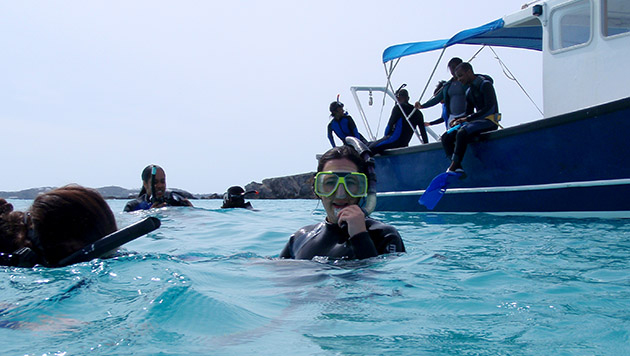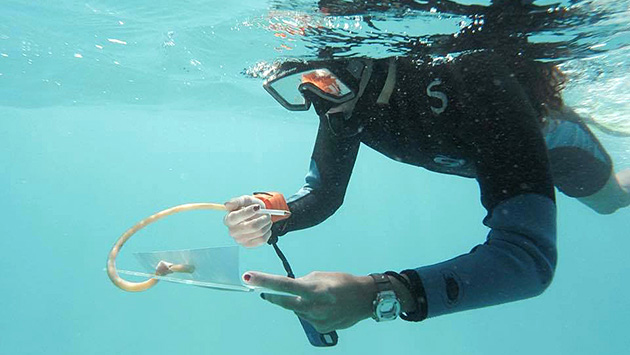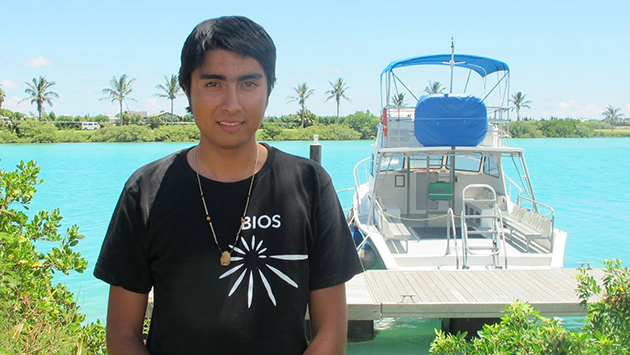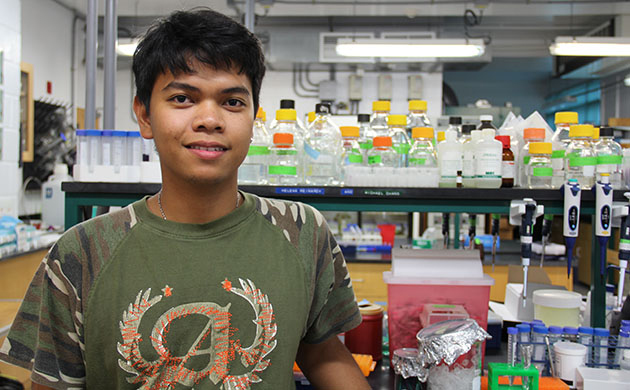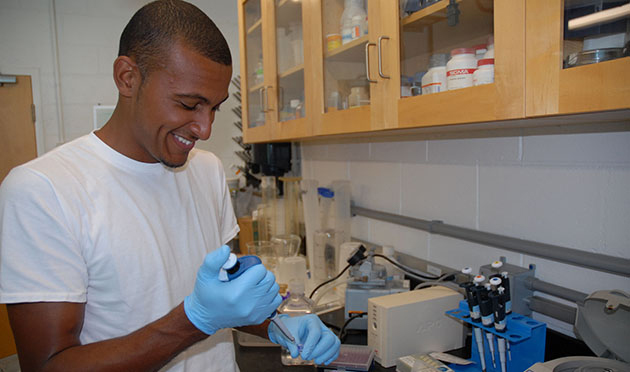Building STEM Pipeline For Bermuda’s Students
Both BIOS and Bermuda College have been working together for the last 12 years in a unique partnership that leverages the resources and expertise of each organization, with the overall goal of improving STEM education and learning opportunities for students in senior school and college.
A spokesperson said, “Both BIOS and Bermuda College are known for providing outstanding educational opportunities in science, technology, engineering and mathematics [STEM] subjects for the island’s young people.
“While the Bermuda College is a degree-granting institution and BIOS is a not-for-profit research and education facility that focuses on training local students in primary, middle, and high school, both organizations have a similar goal: to provide the island’s children and young adults with the knowledge, skills, and experiences required for future success in academics and the workforce.
“In light of these shared goals, the two institutions have been working together for the last 12 years in a unique partnership that leverages the resources and expertise of each organization, with the overall goal of improving STEM education and learning opportunities for students in senior school and college.
For the past 12 years, BIOS and Bermuda College have been working together to improve science, technology, engineering, and mathematics [STEM] education and learning opportunities for students in senior school and college. What began as an annual field trip to BIOS for Bermuda College students has grown into a partnership that encourages those students to apply for research internships at BIOS, as well as ongoing discussions for the development of a marine science degree program at the College, which would be supported by BIOS faculty and staff.
“Currently, Bermuda College is hoping to strengthen its connection to BIOS as it looks to develop a marine science degree program that would allow students to complete an associate degree on island, then finish their bachelor’s degree at a partner institution in the United States or Canada. There is also growing interest at the College in developing a focus within the degree program on maritime careers, such as marine technology, SCUBA diving, marine archaeology, or boat handling.
“Over the years, we’ve had a number of students indicate their interest in marine science fields and we want to be able to provide them with access to the resources required for such an educational track,” said Amy Harvey, an earth and environmental science lecturer at Bermuda College.
“Mark Guishard, director of corporate and community relations at BIOS; Kaitlin Noyes, director of BIOS Ocean Academy; William Curry, BIOS president and CEO; and Andrew Peters, director of university programs at BIOS, all sit on the advisory committee of this program and have been participating in development meetings over the last few months.
Amy Harvey, an earth and environmental science lecturer at Bermuda College, has brought students on field programs to BIOS every year since 2007. Each fall, her class takes a trip that introduces students to endemic and invasive species around Bermuda, as well as the impacts of climate change on coral reef ecosystems. Part of this experience involves participating in field activities, such as in-water surveys to assess the health of Bermuda’s corals.
“BIOS is excited to work with Bermuda College to explore how we can support their efforts to provide new education opportunities to Bermudian students,” Curry said. “The faculty and staff at BIOS are keen to share their expertise and resources to enable the development of a marine science degree program that, ultimately, will benefit the island in terms of a workforce more familiar with maritime and environmental specializations.”
“Should this program come to fruition, it would be the final piece in a STEM pipeline, or long-term educational pathway, for students in Bermuda. Students as young as 12 years old would have the opportunity to enroll in BIOS’s Ocean Science Camp, a program that debuted in the summer of 2018 and is designed to introduce students to Bermuda’s marine environment while providing a foundation in scientific research.
“From there, they could apply to the BIOS Marine Science Internship program, enroll in a marine science degree program at Bermuda College, and apply to the BIOS Bermuda Program, allowing for multiple years of STEM education, mentorship opportunities, technical education, and skills development.
“Harvey, who began working with Bermuda College in 2007, made contact early on with JP Skinner, then-director of Ocean Academy at BIOS, to develop a field-based program at Nonsuch Island that would introduce her students to endemic, native, and invasive species.
“The purpose of the trip was to expose my students to the natural environment, which unfortunately is not the norm for many of them,” Harvey said. “I hoped that an introduction to nature through field experiences would lead to increased understanding and maybe even inspire a more conservation-minded attitude.”
Jorge Sanchez, a Bermuda College graduate, spent three summers as a BIOS Bermuda Program intern working on a project using underwater video systems to measure fish biodiversity and population density on Bermuda’s reefs. He graduated from Dalhousie University in 2014 with a Bachelor of Science in biology and currently works at the Bermuda Aquarium, Museum, and Zoo.
“The initial field trip was so successful that Harvey made it a permanent part of her curriculum, currently made possible by a grant from BIOS’s Curriculum Enrichment Program. Now, each fall, students in her environmental science and atmosphere, weather, and climate classes take a trip to BIOS. The field experience still involves a trip to Nonsuch Island, but now students also learn about the impacts of climate change on coral reef ecosystems and how scientists monitor and assess the health of Bermuda’s corals.
“As a result of this early success, other BIOS scientists were tapped to share their knowledge with Bermuda College students. Guishard is a frequent guest lecturer in Harvey’s classes where, as she puts it, “he provides students with that ‘aha’ moment and pulls everything together they’ve been learning all semester” about weather, climate, and the environment.
“Since 2007, the relationship between BIOS and Bermuda College has solidified as several college graduates have gone on to accept research internships at BIOS.
“Jorge Sanchez, 28, attended Bermuda College from 2008 to 2011, where he earned an associate degree in science. While there, he heard about the BIOS Bermuda Program from one of his professors and subsequently spent three summers [2010, 2012, and 2013] working as an intern with research specialist Tim Noyes in the Coral Reef Ecology and Optics Lab on a long-term project using underwater video systems to determine fish biodiversity and population density on Bermuda’s reefs. He credits his time at BIOS with helping him decide to apply to Dalhousie University in Canada where he graduated in 2014 with a Bachelor of Science in biology. Today, Sanchez works as the Collector of Marine Specimens at the Bermuda Aquarium, Museum, and Zoo.
Jecar Chapman graduated from Bermuda College in 2011 and spent five summers as an intern at BIOS working on a variety of molecular biology and biochemistry projects. He graduated from Dalhousie University in 2017 with a Bachelor of Science in molecular biology/biochemistry and currently works at the Bermuda Hospital Board.
“My time at BIOS helped me realize my love of the ocean,” Sanchez said. “While working with different researchers and scientists on various projects, I learned how to SCUBA dive and conduct real scientific research, which are skills I used throughout my postsecondary schooling, as well as in my current job.”
“Jecar Chapman, 27, was a student in the associate of science degree program at Bermuda College from 2009 to 2011. When a former BIOS lab technician told him about the Bermuda Program, Chapman saw an opportunity to augment his classroom education, applied to the program, and subsequently spent five summers [2010 to 2014] as an intern at BIOS. During this time he worked with [former] biochemist Andrea Bodnar, [former] postdoctoral researcher Helena Reinardy, and microbial oceanographer Rachel Parsons investigating a variety of topics, including how microbes respond to ocean acidification, the use of sea urchin protein as a biomarker for age, and the molecular mechanisms behind the resistance of sea urchins to cancer. He was accepted to Dalhousie University in 2013 and graduated in 2017 with a Bachelor of Science in molecular biology/biochemistry. Chapman is currently working as a medical laboratory technician at the Bermuda Hospital Board.
“I gained so much experience and knowledge from my time at BIOS, including many skills that I used in my courses at Bermuda College and still use today,” Chapman said. “The years I spent as a Bermuda Program intern were a stepping stone to earning my undergraduate degree and returning to Bermuda to work in the medical field.”
Stephen Lightbourne, also a Bermuda College graduate, worked as a Bermuda Program intern during the summer of 2011 on a project using human gut bacteria as an indicator of water pollution in Bermuda’s inshore waters. In 2015 he received his Bachelor of Science in physiotherapy from the University of London and he graduated from the University of Birmingham earlier this year with a Master of Science in advanced manipulative physiotherapy. He is returning to Bermuda this summer to work at the Bermuda Hospital Board.
“Stephen Lightbourne, 28, studied at Bermuda College from 2009 to 2012, when he graduated with an associate degree in science. He learned about the Bermuda Program from a fellow student at Bermuda College and spent four months in 2011 working with Parsons in the Microbial Ecology Laboratory on a project using human gut bacteria as an indicator of water pollution in Bermuda’s inshore waters. In 2015 Lightbourne completed his Bachelor of Science in physiotherapy at the University of London, and earlier this year he received his Master of Science in advanced manipulative physiotherapy from the University of Birmingham in the United Kingdom. He is returning to Bermuda this summer to restart employment with the Bermuda Hospital Board working in their outpatient musculoskeletal patient and orthopedic department, where he previously completed a one-year rotation during his master’s program.
“My time at BIOS was an opportunity for me to explore and understand the island I call home on a totally different level,” Lightbourne said. “As a professional in science I know the importance of conducting research on the environment so that it can give us the data we need for informed decision-making concerning the island and our people.”
“The Bermuda Institute of Ocean Sciences is an independent U.S. not-for-profit marine research and educational organization with 501[c][3] status and a Bermuda Registered Charity [#116]. For over 100 years BIOS-based researchers and visiting scientists have worked to explore the ocean and address important local and global environmental issues.”
Read More About
Category: All, Environment, News

